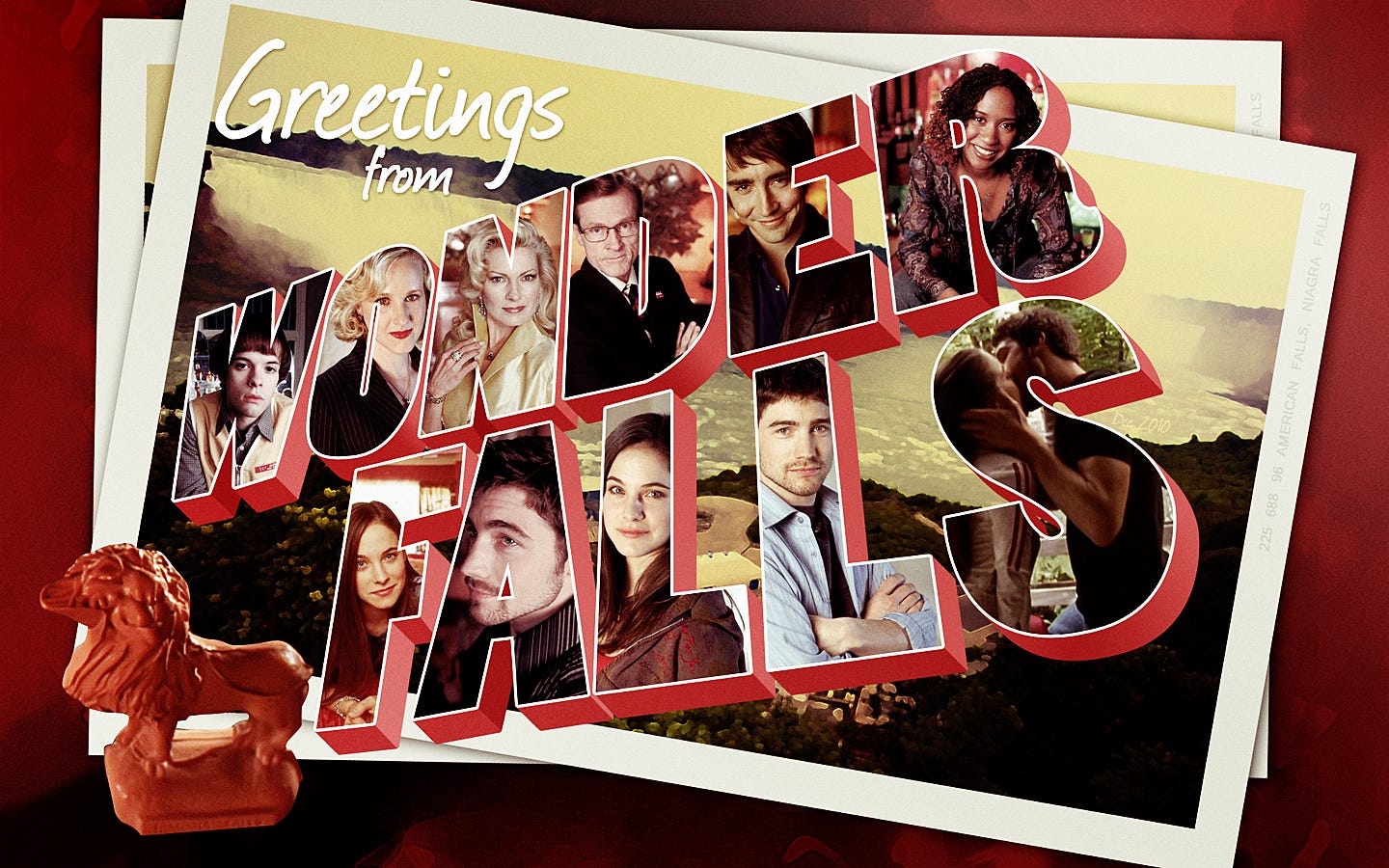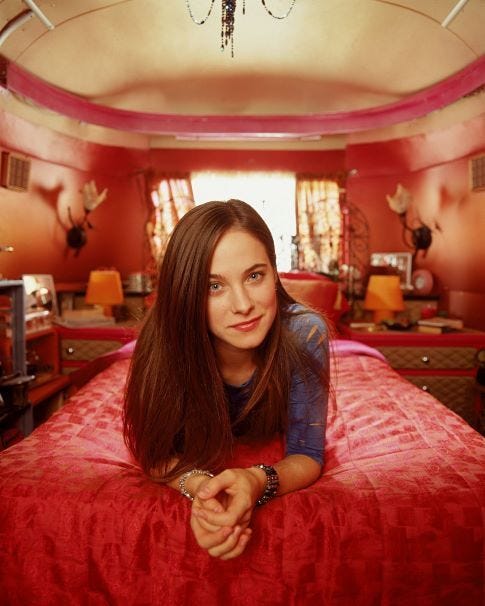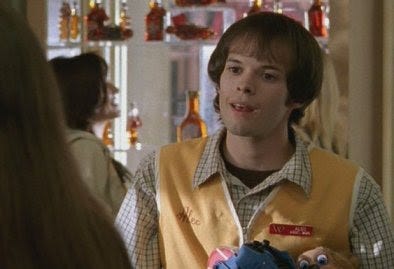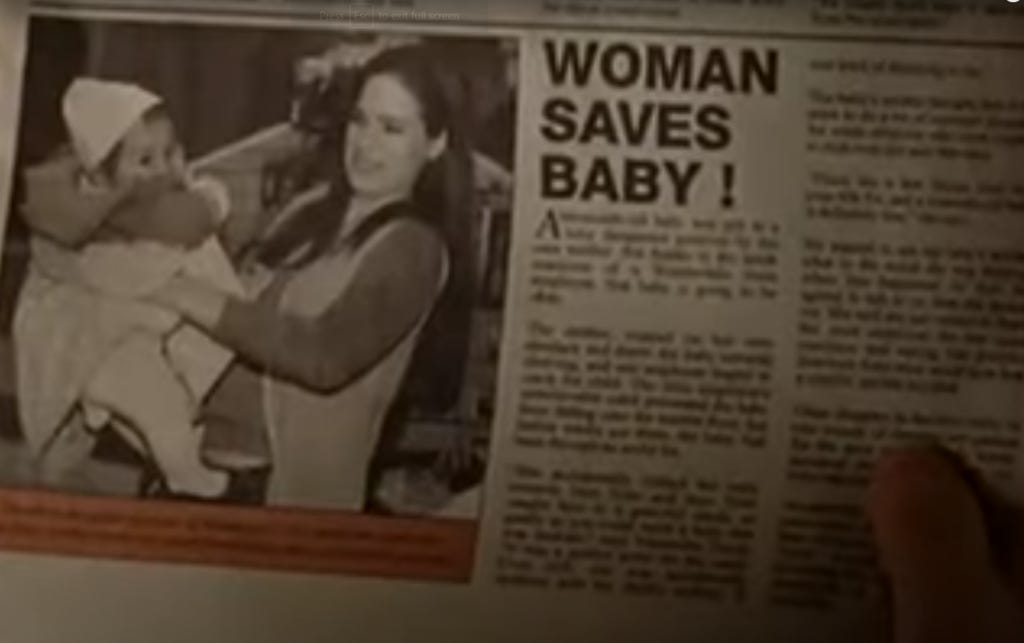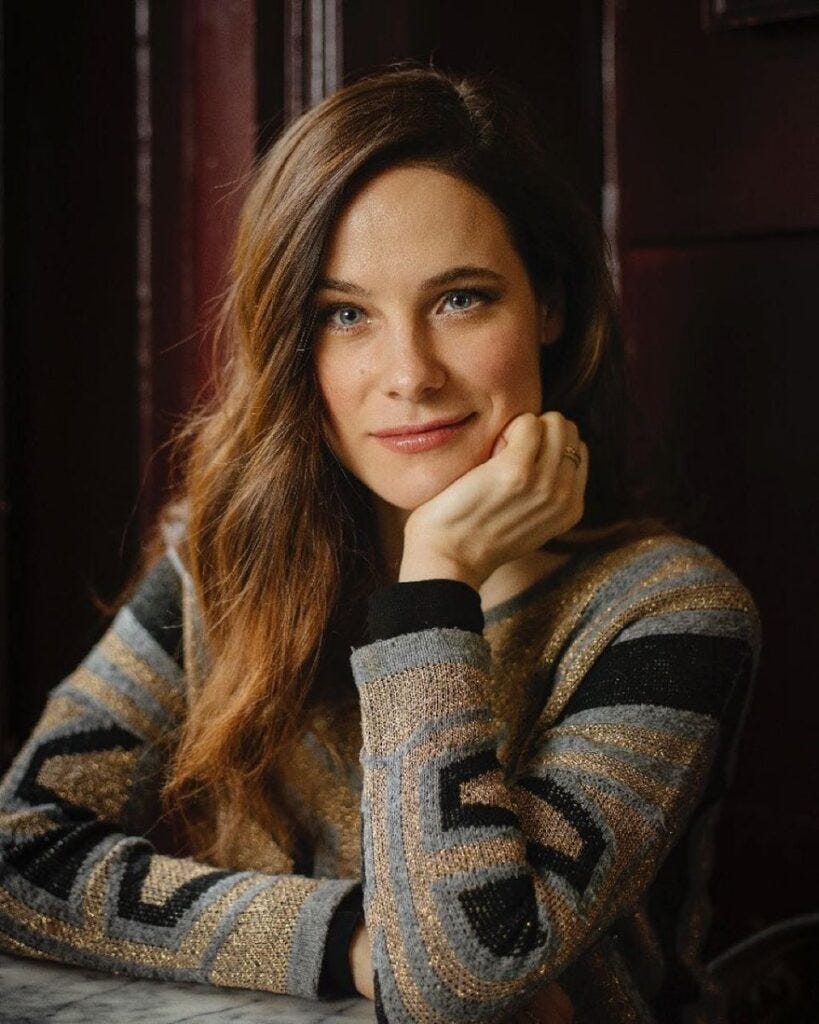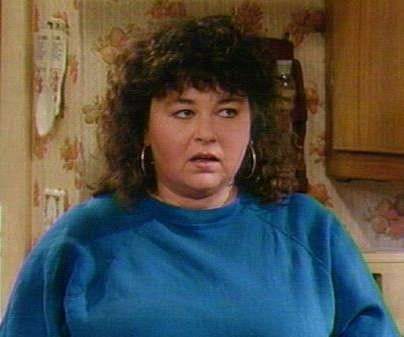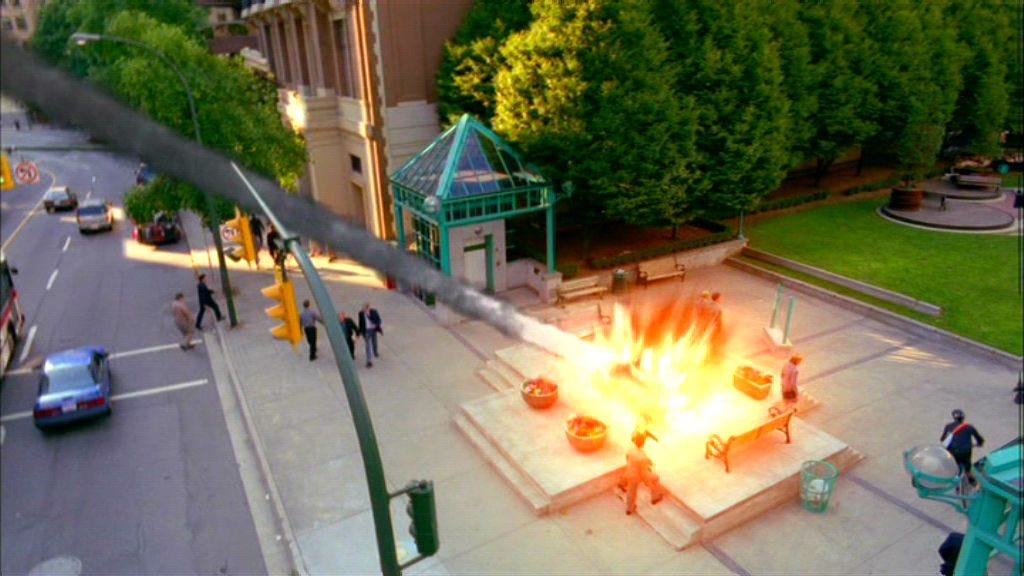I Wonder, Wonder Why the Ratings Fall
But there's something really mystifying: got me laughing, and it's got me crying: all my life I will be death-defying just to know--I wonder, wonder why the ratings fall?
In 2004, Fox greenlit a television series called Wonderfalls about a chronically apathetic "over-educated under-achiever” who is bequeathed the superpower of divination—but only through talking to the spirits (henceforth 'muses') that reside within toys, statues, and stuffed animals.1 Every episode, these muses enigmatically coerce the heroine into performing acts of kindness, thus creating a fairly standard 'client' TV mystery-ish series format.
You probably hadn't heard of it until today. For this I forgive you.
It was created by Bryan Fuller, co-executive produced by Todd Holland and Tim Minear, and was not a financial success. A 13 episode season was produced, but only four of these ever aired. The rest were ultimately released via DVD some years later, but the series has never been licensed digitally and, as of 2020, appears totally orphaned.
In Wonderfalls, Caroline Dhavernas stars as Jaye Tyler, a misanthropic 24-year-old Brown University philosophy graduate now living in a trailer park and working at a Niagara Falls gift shop. Her father is a successful doctor, her mother an acclaimed writer, her elder sister a famous lawyer, and her elder brother an aspiring theologian; their names are Darrin, Karen, Sharon, and Aaron, respectively.
Each episode sees Jaye struggle with her newfound powers, grappling with her own sanity, courting her hot (but recently married!) love interest Eric (Tyrone Letso), and generally making the world a better place--accidentally, despite her worst intentions.
The Search for Answers
One of the most remarkable features of the series retrospect is that it was on the air more or less simultaneously with two eerily similar network shows—Joan of Arcadia (2003-2005, CBS) and Arrested Development (2003-2006, 2013, 2019, Fox and Netflix). Joan of Arcadia’s core premise is in fact the same as Wonderfalls’ on paper: a young woman receives the ability to communicate with “God” and is compelled to help those around her. Relative to Arrested Development, the series was a "complex comedy" about a zany, dysfunctional, upper class, and white family.
None of these three shows were resounding commercial successes, but it should be safe to say that Wonderfalls was by far the least long-lived, failing to broadcast more than half of its first season—much less find renewal for a second. This reality does not correspond with quality.
Arrested Development is a brilliant, if very silly, comedy farce. Joan of Arcadia is hardly worth remembering. But in objective terms, Wonderfalls is quite possibly the best television series ever aired, for what it is. It is brilliantly acted, written, edited, and directed.
So why did it flounder where others merely stumbled?
The answers are, tragically, not hard to identify. It was protagonist Jaye Tyler, combined with the series’ extreme edge and immense wit, that condemned the series to a paltry four-episode broadcast run. These are the things that I wish to examine here.
Context
Fuller, the brains behind the narrative components of the series, had only recently departed his debut series Dead Like Me (2003-2004) on Showtime when Wonderfalls was picked up by Fox. Tim Minear had worked extensively with Joss Whedon as a writer and sometimes-executive producer on Buffy the Vampire Slayer (1997-2003, WB) spinoff Angel (1999-2004, WB) and sci-fi Western Firefly (2002, Fox). The pedigree of these two showrunners is worth dwelling on.
Whedon’s television trifecta remains popular to this day and is perhaps most notable for its snappy, post-modern, and witty dialogue; these are the sensibilities Minear brought to Wonderfalls.
Fuller himself was not enormously famous at the time—he departed Dead Like Me after only a handful of episodes—but has since developed a cult following with subsequent series such as Pushing Daisies (2007-2009, ABC) and Hannibal (2013-2015).
Stylistic parallels with both Minear and Fuller’s antecedent series are hard to miss. Fuller’s brand is distinctive. Dead Like Me is a dark supernatural comedy about a young woman who is killed and has the bad luck to become a “grim reaper.”
Protagonist Georgia (George) Lass is, in terms of personality, almost identical to Jaye Tyler—although their performances are miles apart—and both, in characteristic Fuller style, are heroines with unusually masculine first names. Like Angel and Firefly, the dialogue in Wonderfalls is fast-paced, witty, and charming; and like both Buffy and Dead Like Me, Jaye is a young woman who involuntarily receives supernatural powers and struggles to balance them with her social and professional obligations. Finally, like Buffy, Wonderfalls dwells significantly on lesbian characters.
There is one further series worth drawing attention to in this regard.
Joan of Arcadia utilized a traditional, broadcast televisual style and received positive reviews and an Emmy nomination.2 This was Wonderfalls’ most obvious competitor, and similarities between the two series were noted by critics at the time.3 The immense success of Buffy provides the most likely explanation for how it came to be that these series, so similar in abstract, aired simultaneously.4 Another may be that, in the immediate aftermath of 9/11, America’s faith in the order of the world was severely disrupted.5 The spirituality of both Wonderfalls and Joan of Arcadia offers an antidote—reassurance in destiny.
But this does nothing to explain why Wonderfalls flopped so disastrously; every show mentioned here (except Firefly) made it to at least a second season. Clearly something about Fuller and Minear together in execution, rather than premise, doomed their series to cult status.
Jaye Tyler
Performance
The most notable component to Jaye is Dhavernas’ performance. It is distinctive. She epitomizes the “disaffected 20-something.”
Take the pilot episode:
Jaye receives her superpower and is accosted by the series’ first muse: a smoosh-faced wax lion. He commands her to ask “Poor Bitch,” her name for the local UPS driver, what happened to his wedding ring. Her face rests in a permanent bored nothingness. Every line is flat and uninterested and followed by an eye-roll, even during small-talk. To smile seems as though it pains her.
This is more or less how Jaye always acts—that is, until the wax lion starts to talk. Suddenly Dhavernas’ performance shifts entirely; from casual boredom to complete terror, eyes-wide, almost sweating.
Finally she gives in to the wax lion’s demands and asks Poor Bitch, but no effort at all is made to sound concerned or interested. Then, through a cutaway flashback we learn that Poor Bitch has already explained his divorce to Jaye. She’s simply forgotten.
Dhavernas holds an expression of disgust throughout this conversation. She couldn’t care less about Poor Bitch or his breakup. Her only interest is to see the Wax Lion shut up. It would not be a stretch to say that performance makes Jaye comes off as abrasive and unsympathetic in this scene--and we're only fifteen minutes into the series.
Writing
The writers make no effort at all to redeem their protagonist. In the subsequent scene, she steals from a wishing well and sarcastically bites at a well-meaning little girl to “piss off.”
When her wallet is returned to her after having been lost, she tells its impoverished bearer:
Wait, I can't let you give me your last eight dollars. Here's five back.
Jaye conspicuously uses judgmental nicknames like “Poor Bitch” throughout the entire series; several episodes later, she will refer to her reclusive neighbor Patrick first as the “Fatsquatch,” and then “Fat Pat;” and she only ever refers to series regular Alec, her manager at the Wonderfalls Gift Emporium, as “Mouthbreather”—to the extent that a casual viewer might think it his actual name.
In the second episode she mocks a disabled character’s stutter, to the horror of her best friends. Her time spent at the Wonderfalls gift shop casts her as a monument to lethargy. She's often rude to customers. A personal favorite moment sees Jaye (accidentally) save a baby. Her response is telling:
JAYE: It's humiliating. I don't save babies. This [photo] misrepresents me.
ERIC: You saved that baby.
JAYE: I didn't do anything. It fell on me. I could've been a pillow. That should say “Pillow Saves Baby.”
MAHANDRA: That baby looks like a human shield in your hands.
JAYE: Thank you! See? This woman knows me. She knows [baby-saver] isn't who I am.
MAHANDRA: That's not who she is.
JAYE: She knows I'm not considerate of my fellow man.
Alas, Jaye’s characterization of herself is spot-on. Not only is she inconsiderate of her fellow man, her selfishness is a source of pride.
That’s why she’s so fun!
To those of us everywhere who are ourselves disaffected 20-somethings, Jaye’s irreverence, sarcasm, and general aura of malevolence creates endearment, not alienation. She acts out all of our most inhibited desires: to have no ambition or stress or expectations in life, to say exactly what we think whenever we think it. As she herself articulates:
Take my family. They all work really hard and are still dissatisfied. I can be dissatisfied while hardly working at all.
I know I've felt this way in the past!
This makes Jaye an empathetic, rather than a sympathetic, character. She does little to earn audience sympathy, and in fact does quite a lot not to earn it. But she's relatable. She's full of personality. She's totally independent-minded. She's in a position that many young people are familiar with. She's catty and a little bit snide, yes, but she's also very funny:
DR. RON: Tell me about your sister.
JAYE: She hates me.
DR. RON: Hate is a strong word.
JAYE: Yeah. Well. What are you gonna do.
DR. RON: How does that make you feel?
JAYE: One less person to worry about?
To bring it back to empathy, they proceed:
DR. RON: When was the last time you told your sister you loved her?
JAYE: I don’t know how you did things in your family, but we weren’t raised that way.
If you're from a family like mine, the empathetic link with Jaye is immediately established by this single line. It sounds just like home. But if you can't relate to the sentiment she's expressing here, she will probably seem strange and uncaring to you and you will not like her.
Empathy requires work and viewer willingness, and this is to ask more than is realistic from network television audiences--at least with a lead. Wonderfalls was a new series, aired in January, that must have seemed derivative at the time, within a sea of network television, and its writers asked for the benefit of the doubt. Tragic though it may be, I don't think it's unreasonable that the benefit of the doubt was not given.
Here comparisons back to Buffy and Dead Like Me become vital. Despite numerous similarities to Jaye, George Lass is an immensely sympathetic character. We watch her die at age 18. That guarantees likability. George also comes across as more involuntarily flawed, whereas Jaye revels in her “trailer-park hillbilly lifestyle” (as her brother puts it). Finally, Ellen Muth is not Hollywood beautiful. She looks like a normal person. Dhavernas is Hollywood beautiful, and that changes how the audience perceives her--in this case, perhaps for the negative.
(Just as how Chris Pratt went to LA and couldn't land comedic roles until he gained weight and cultivated a less "macho" persona, appearances matter a lot to audiences and their expectations.)
For this point I would cite the success of Roseanne Barr. She was the unconventional comedic lead of her own series, but her brand was in actively not being a petite and perfectly sculpted French-Canadian TV actress. It's impossible to prove a negative, but I find it hard to imagine Roseanne working in the way it did if Barr had looked like this...
instead of this...
Yes, I'm saying that mainstream audiences would have tolerated Jaye's personality if she had been fat. Dhavernas is too pretty. On instinct, audiences don't feel like attractive people (especially those from idyllic upper middle-class white families in New York) have anything to be bitter over. There, I said it. Don't @ me.
Meanwhile Buffy, like Jaye, is often witty, but she is otherwise fairly conventional—and she takes her duty seriously. Buffy saves people. It's hard not to like a hero. Jaye is spiteful and takes active pain in helping other people with their problems, and she only ever does so for selfish reasons.
It will surprise no one, then, to learn that the series tested poorly in screenings.6 More damningly, critics unanimously condemned Jaye as unlikeable, and predicted imminent cancellation after just the first episode. No one knew what to make of a comedic anti-hero as played by a conventionally attractive actress.7
Cinematography
The inscrutable heroine could be workable for the unconvinced viewer given time, especially in a comedy, but the killing blow is yet to come. The muses are presented as a CGI character, with an animated faces but otherwise static bodies. Already we’re bearing witness to a phenomenon that is ostensibly psychological—no one else can see or hear the muses talking—and this fact is reinforced by close-ups from Jaye’s perspective, all of which are filmed from a high angle so as to replicate the visual of a human gazing downward onto an inanimate object.
Throughout the entire series, this style of cinematography places us firmly within Jaye’s first-person perspective. We are inside of her head. When this is combined with the character’s general ‘unlikability,’ the results are disastrous. If the viewer does not identify with Jaye, his response will be to abort—to get away from this place of subjectivity as quickly as possible. And because the series is so entirely about Jaye, this leaves nothing to stay engaged with, and results in yet another lost viewer.
This is the root of so much of the series’ trouble. Problematic characters abound in TV, but Jaye is the protagonist. Wonderfalls, as the above illustrated subjective focus shows, is about her specifically. She is in nearly every episode of every scene, with screentime only rarely cutting over to her elder sister—a closeted lesbian—and effectively no one else, ever.
Wit
Jaye serves as the perfect vessel for Minear and Fuller’s amazing wit. In Firefly and Buffy, which teeter on the edge of melodrama (and in later seasons of Buffy fall directly off ), the snappy post-modern dialogue has always felt wrong to me. It doesn't fit the dark tone of Whedon's series.
But Wonderfalls is a comedy, and as a comedy it does not suffer from this problem. So when Minear is combined with instead Fuller, who I believe to be one of TV's finest character writers, for the purposes of a comedy, the results are spectacular. Their wit, along with the wits of their staff writers, is incredible in this series. There is no dissonance. The cultivated tone is unique, hilarious, and entrancing.
This undoubtedly increased Wonderfalls’ barrier to entry. It is not a series one can watch while doing the laundry. It is too complex as a comedy. It demands attention that casual audiences likely will not give it. Here are a few examples from throughout the series.
After the Tyler family has had a falling out...
KAREN: Sharon, go talk to your father. You're his favorite.
AARON: I thought I was his favorite.
KAREN: We don't have favorites.
At a family lunch...
AARON: There’s something out there and it’s laughing at us.
DARRIN: I don’t think your sister’s special lunch is an appropriate place for an existential crisis.
AARON: It’s not an existential crisis.
KAREN: You’re studying religion for God’s sake, you were bound to have one sooner or later.
AARON: I’m not in existential crisis! Just the opposite. I was fine when existence had no meaning. Meaninglessness in a universe that has no meaning—that I get. But meaninglessness in a universe that has meaning...what does it mean?
JAYE: It doesn't mean anything.
After Jaye's father has been in an accident...
JAYE: I can’t help you. My father’s in the hospital. I wouldn’t feel right having so much…fun.
MAHANDRA: Your father’s in the hospital?
JAYE: He got run over.
MAHANDRA: I’m sure you didn’t mean to.
Similarly, in Whedon's style, the dialogue is also full of pop-culture references—although not always ones which mainstream audiences will get:
JAYE: You’re like that girl in that movie who wanted to be that other girl so much that she KILLED FOR IT!
BIANCA: Grease?
JAYE: Single White Female!
When speaking to a Catholic priest, discussing a nun...
JAYE: Did you Agnes of God her? Yeah. I bet he Agnes of God-ed all over her!
Extracting comedy, or even narrative value, from scenes written like this requires attention. Even the names of the Tyler family themselves—Aaron, Karen, Darrin, Sharon, and Jaye—is a joke that most viewers will probably miss.

As Minear himself has noted, TV with edge, quirk, and wit demands audience engagement.8 When a series only broadcasts four of its thirteen episodes, how on Earth will audiences become engaged?
Edge
Still, Buffy and Angel, and even Dead Like Me, are similarly witty, and all did well in terms of longevity relative to Wonderfalls. This is where the final factor comes into play, the key into understanding why audiences were so alienated by the series: edge.
To define the word for my purposes here, I mean "having the quality of pushing boundaries; genuine progressivism."
Leaving aside Jaye, who is herself quite edgy for a network heroine, the character of Sharon Tyler—Jaye’s eldest sibling—demands examination. Sharon is a woman of contradictions: she is a lesbian Republican immigration attorney, and she is one of the few characters we ever see outside of Jaye’s perspective. She is the closest thing the series has to a deuteragonist and her repressed sexuality is at the forefront of a number of episodes.
The notion of a lead lesbian character on network TV would (probably) not be considered edgy today, but, according to Fuller, it was a huge fiasco in 2004.9 Fox would only allow the writers to use the word “lesbian” a certain number of times per episode, and they were forbidden from doing anything more than imply that Sharon Tyler was having sex with another woman.
Most religious shows do not have this problem. Most religious shows are conservative, not progressive, and herein lies the most important point. Although both Wonderfalls and Joan of Arcadia are explicitly written as modern-day takes on Joan of Arc, one is ironic and the other is sincere.10
Wonderfalls explores religious themes extensively, featuring arcs with priests, nuns, and theologians, but it does so in a way that will not appeal to mainstream Christian audiences. It bears noting that the series was almost immediately re-aired off of Fox on niche channels, most conspicuously the religious Vision Network in Canada and the gay-and-lesbian channel Logo in the US.11 With the proper context it seems natural that the series would develop a cult following in these spheres, but these are obviously unlikely companions in the championing of a television program.
I want to reiterate that it was not its focus on gay characters that doomed Wonderfalls, nor was it its use of religious styling. It was these two things taken together that created a particularly unstable niche. I believe the immense success of Buffy and the modest success of Joan of Arcadia demonstrates this point.
Buffy explicitly shows Willow’s lesbianism throughout its final seasons and its ratings did not suffer, and in a period even earlier than that of Wonderfalls. Meanwhile, Joan’s conventional religious themes were likely more appealing to an older, conservative audience, of precisely the type who might be put off by Sharon Tyler’s lesbian romances and the series’ general irony. God in Joan of Arcadia is, after all, explicit, with a capital G.13 Jaye Tyler’s god is far less angelic, undeniably spiritual but religiously skeptic, rooted in animism and not Christian monotheism.
Whatever words we want to use, it can be agreed that nothing about Wonderfalls is conservative, least of all its religious elements. That is the primary reason why the series failed to find its audience.

Finally, while Buffy, Angel, and Dead Like Me are, without a doubt, similarly edgy to Wonderfalls, I want to point out that they are series which focus extensively on violence. Even Dead Like Me, which is effectively a talking head comedy, sees at least two violent deaths per episode.
This is the sort of series that will appeal to an edgy young person. Edgy young people like to watch TV about death, violence, and tragedy, even if it's a comedy. What they are less interested in is the romantic and situational comedy.
Wonderfalls is a romantic, situational comedy.
Yes, it's in an hour-long format. But it is a pure romantic comedy at its core, in addition to having light supernatural mystery elements. Hardly anybody ever dies in Wonderfalls. It isn't dark.
Edginess and darkness tend to go together. A lack of darkness, full of edginess? An unusual combination, to say the least.
Conclusion
Wonderfalls is edgy, cultish, televisual, and narrowcasted. Although it conforms to a number of contemporary trends, it was built for re-watching and viewer dedication—the two things Fox could not afford to give it.13 That accounts for the disparity of success relative to Joan of Arcadia.
But, to bring it back to my introduction, what about Arrested Development? There was a show just as televisual and just as niche, that demanded just as much from the audience, and that performed almost immeasurably better on the same network—and during the same year!
Here it comes down to subject matter rather than style. Although the Tyler family is in many ways similar to the Bluths, and both series are witty and demanding of audience engagement, the barrier to entry in Arrested Development is much lower. Michael Bluth is a handsome, basically likable straightman who no one could find off-putting. His familial misadventures are relatable and have very little to do with contemporary politics or spirituality, and only superficially delve into subjects like sexuality.
Even if the viewer dislikes one of the characters, the sheer size of the cast guarantees something for everyone. The same can be said for most shows I’ve drawn comparisons to in this essay: Dead Like Me, Buffy, and Angel are all ensemble series, with each character sharing the burden of lead. If the viewer does not like the eponymous protagonist, he will find someone else.
Wonderfalls takes the opposite approach to TV. Jaye is in nearly every scene of every episode. She may be attractive, much as Michael is, but she is fundamentally not a straightwoman; and as I’ve demonstrated in detail here, there are a huge number of qualities to her character that audiences might take issue with.
The series does develop its ensemble more thoroughly in later episodes, but its cancellation was too immediate. Audiences never reached the point where their contentions with Jaye may have been alleviated.
Meanwhile, in terms of subject matter, Wonderfalls balances religious themes with those of sexual identity, and is an extremely edgy and progressive show. But edgy young people, of the sort who like Buffy and Angel and who are willing to tolerate Jaye, are likely not interested in issues of spirituality and will not appreciate references to Agnes of God. They don't want romantic comedy; they want dark comedy--or even melodrama with comedic elements. But Wonderfalls is very restrained in its melodrama. Although often emotional, especially toward its conclusion, it isn't usually sappy in the way Buffy so constantly is. The writers didn't give in to that kind of pressure.
So who, besides me, was Wonderfalls for?
It’s impossible to point to any definite subset of the population. Like Arrested Development, it is a series that appeals to individuals for a whole slew of varied reasons, rather than sweeping demographics. Even fifteen years later, even after a successful campaign for resurrection on DVD, there has been no streaming renaissance for Wonderfalls, nor even a Blu-Ray rerelease.14 As of 2021 the series appears entirely orphaned: all of its 13 episodes are available for free on YouTube and have been for years.
Even despite this accessibility, its pilot only has two hundred thousand views, and subsequent episodes as few twenty thousand. This hardly means anything anyway, since at least half of those twenty thousand are me.
And so it seems that Wonderfalls is simply too niche. It was a bad fit for Fox, but its low profile today suggests it wouldn’t have fared much better on cable or a streaming platform. It’s a shame. Then again, the series’ complete disregard of commerciality is what makes it so fantastic—and so unique. Maybe that makes up for its short broadcast run.
So Who Cares?
I know what you're thinking. Who cares about why some mid-season replacement on Fox from 17 years ago that faceplanted after its fourth episode? Why is it worth studying? Who have I written this argument for? Does anyone in the entire galaxy remember this show beyond this blog? Why do the reasons for its cancellation matter at all today, when the landscape of entertainment is so entirely different?
I do not have good answers to these questions. But Wonderfalls does tell us something about narrowcasting versus broadcasting. It tells us, I believe, about the role of subjectivity in passive entertainment. It teaches us about empathy and sympathy and the ways in which a brilliantly written series can fail simply because audiences cannot connect with its lead.
So, if you ever find yourself writing a television show for Fox, think not only of the hits of the network, but also of the Wonderfalls. Maybe you'll be able to make something as good that actually will last. Those who fail to learn history are doomed to repeat it, as they say.
Then again, this is a bit of history I wouldn't mind seeing repeated--even if it is just for another four episodes.
Notes
1. “Wax Lion.” Wonderfalls. Written by Bryan Fuller, directed by Todd Holland. Fox, 2004. YouTube, https://youtu.be/nE_uvysLeIo?t=904. Commentary provided on DVD.
2. Beeler, Stan. "Wonderfalls." The Essential Cult TV Reader. Edited by David Lavery. 1st ed. UP of Kentucky, 2015. 322-327. Ebook. https://ebookcentral.proquest.com/lib/uaz/reader.action?docID=1915114.
3. Catlin, Roger. "`WONDERFALLS' RESCUED FROM OBLIVION: [STATEWIDE EDITION]." Hartford Courant, Feb 18, 2005. http://ezproxy.library.arizona.edu/login?url=https://www-proquest-com.ezproxy2.library.arizona.edu/docview/256850112?accountid=8360; Lowry, Brian. "Wonderfalls." Daily Variety 282.54 (2004): 7. https://go-gale-com.ezproxy2.library.arizona.edu/ps/i.do?p=AONE&u=uarizona_main&id=GALE|A115077160&v=2.1&it=r; Garron, Barry. "Wonderfalls." Hollywood Reporter, vol. 382, no. 50, 12 Mar. 2004, p. 9. Gale In Context: Biography.
4. "Teen Girls' Spiritual Lives Hit Small Screen." Marketing to Women: Addressing Women and Women's Sensibilities, vol. 16, no. 11, Nov. 2003, p. 8. https://link.gale.com/apps/doc/A111016707/AONE?u=uarizona_main&sid=AONE&xid=fa92a68d.
4. Frutkin, A. J. "Where's Wonderfalls?" Mediaweek, vol. 14, no. 2, 2004, pp. 18-20. http://ezproxy.library.arizona.edu/login?url=https://www-proquest-com.ezproxy2.library.arizona.edu/docview/213670521?accountid=8360.
5. Frutkin.
6. Lowry; Garron; Catlin.
7. Frutkin.
8. "Wax Lion" Commentary.
9. Beeler, Karin E. Seers, Witches and Psychics on Screen: An Analysis of Women Visionary Characters in Recent Television and Film. Jefferson, N.C.: McFarland, 2008, p. 101-102. Ebook.
10. Stan Beeler, 324.
11. Stan Beeler, 323-325.
12. Wilcox, Rhonda. "God's Clothes, God's Bones: The Ethics of Representation on Joan of Arcadia." Studies in Popular Culture 28.1 (2005): p. 94; Levine, Stuart. "Joan of Arcadia: Hall monitors just the right balance between religion, ratings." Daily Variety, vol. 283, no. 52, 17 June 2004. Web.
13. Mittell, Jason. "Narrative Complexity in Contemporary American Television." Velvet Light Trap, no. 58, 2006, pp. 29-40.
14. Snierson, Dan. “The Moment of Bluth.” Entertainment Weekly, April 2013; Stan Beeler, 322.


